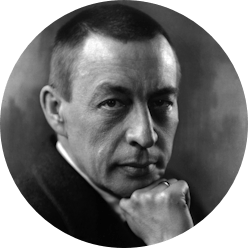
Sergei Rachmaninov
April 1, 1873 - Oneg (Russia) — March 28, 1943 - Beverly Hills (USA)
© Kubey Rembrandt (1921)
About
Rachmaninov, the last of the Romantics, conquered the public’s heart with his second piano concerto, (1901). A remarkable pianist, he received a solid musical education at the Moscow Conservatory with Siloti, (piano) and Taneïev, (composition). Impassioned by Romanticism and encouraged by Tchaikovsky, Rachmaninov’s first main compositions concentrated on the piano, like Chopin or Schumann, which he played perfectly.
Although his musical debut was flamboyant, with the failure of his first symphony’s premiere in 1897, he suffered deep depression. He had to wait until the beginning of the 20th century before his music was acknowledged and hailed by the greatest. His tours of Great Britain and the United States where Mahler figured among his conductors were a total triumph. In 1917, Rachmaninov left Russia to live alternately between Switzerland and the United States.
Of a melancholic temperament, Rachmaninov left behind poetic and brilliantly written works for the piano. His lyricism gives rise to works of epic inspiration such as the sumptuous symphonic poem, Isle of the Dead (1909) whose morbid expression is incredible. Sheltered from the turmoil of the century, this contemporary of Schoenberg and Ravel never seemed touched by modernity. Rachmaninov’s work plunges into the roots of Russia giving rise to pages of overwhelming, flamboyant Romanticism. His choral works, the Liturgy of St John Chrysostom and the Vespers are the most beautiful examples of the depth of Slavic culture from the last of the Romantics.

